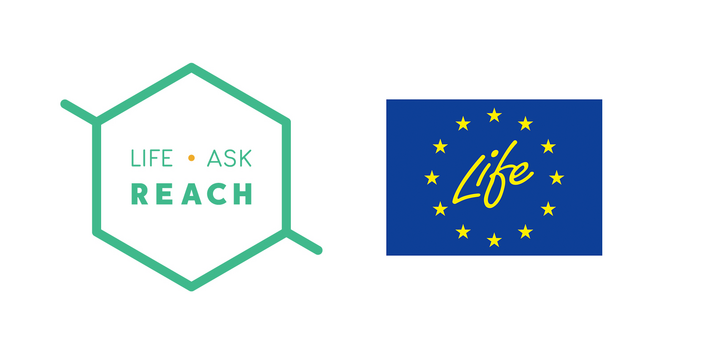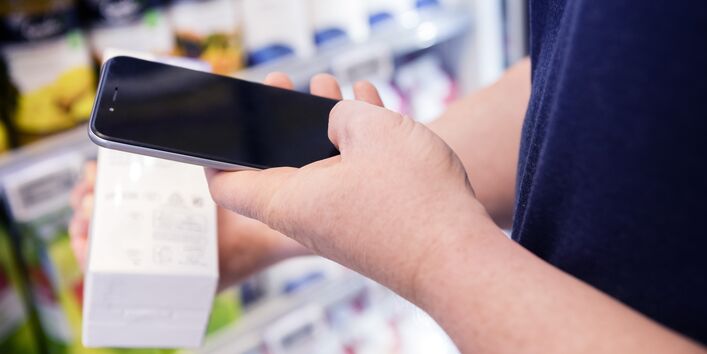Substances of Very High Concern (SVHCs) can, for example, have carcinogenic or endocrine disrupting properties or be very persistent or bio-accumulative in the environment. The European Chemicals Regulation REACH stipulates duties to communicate information with regard to SVHCs (Art. 33). If an SVHC is present in an article (at a concentration of more than 0.1% w/w), this information must be communicated to every commercial recipient by every actor along the supply chain. The term “articles” in the REACH Regulation applies to most solid objects used by consumers, including household goods, textiles, shoes, sportswear, furniture, DIY products, electrical & electronic equipment, toys, vehicles, or packaging. Consumers are likewise entitled to receive SVHC relevant information on articles upon request and can use this to make well-informed purchase decisions.
To raise awareness among the European population about their “Right-to-know”, the German Environment Agency (UBA) launched the EU LIFE project AskREACH in collaboration with 19 project partners from 13 EU Member States. The project had the following objectives:
- raising awareness about SVHCs in articles, enabling consumers to make responsible purchasing decisions,
- raising article supplier awareness on compliance with REACH information duties,
- improving the information flow on SVHCs between consumers and suppliers,
- improving supply chain communication processes that ultimately aim at substituting SVHCs in articles.
With the smartphone app (Scan4Chem) developed in the AskREACH project, consumers can scan the barcodes of articles. They will then receive information about the presence or absence of SVHCs in these articles directly via the AskREACH database or - if there is no information in the database - they will be able to send a request to the article supplier. The latter can send them the information by e-mail or enter relevant data into the European AskREACH database so that future requests can be answered directly. Data is submitted via a user interface (supplier frontend).
Companies could receive additional support through the project by having access to an IT tool that facilitates communication within the supply chain.
All citizens in the AskREACH partner countries can download the app free of charge from Google Play or App Store. The app is adapted to all relevant languages. If the desired information about an article is not yet available in the database, a request is automatically generated and can be sent by the app user to the article supplier.
Since the end of October 2019, the app has successively been released in the AskREACH partner countries. As of May 2024, the app is available in 21 countries in Europe: Austria, Belgium, Bulgaria, Croatia, Czech Republic, Denmark (Tjek Kemien), Estonia, France, Germany, Greece, Hungary, Latvia, Lithuania, Luxembourg, Poland (Pytaj o chemię), Portugal, Serbia (app also available in Bosnia-Herzegovina and Montenegro), Spain, Sweden (Kemikalieappen). The aim is to spread the app throughout Europe.
Two information campaigns were organised as part of AskREACH and will continue to some extent after the project. They serve to raise awareness among consumers and article suppliers. The campaigns are being carried out in all AskREACH partner countries and in further European countries (Belgium, Bulgaria, Estonia, Hungary, Lithuania, Serbia).
Companies benefit in several ways from the project:
- Registered companies may use response templates for answering consumer information requests which help to promptly fulfil obligations according to Art. 33 of the REACH regulation, with minimal effort.
- SVHC article information can also be uploaded in bulk in one step and updated easily when necessary.
- It is possible to declare that all articles in a barcode range are without SVHCs at concentrations above 0.1% w/w
- Reminders are sent for information updates every time new substances have been identified as SVHCs.
- Consumers have immediate access to article information, which means customer support will not have to deal with every individual consumer information request –saving time and effort for both parties.
- Potential customers appreciate being able to obtain SVHC information directly at the point of sale, so that they can make an informed choice before their purchase.
The IT tool for SVHC communications along the supply chain helps companies to obtain and manage information on SVHCs in their articles from their upstream suppliers. It is an existing commercial tool that could be tested free of charge by some companies during the project period. It has been optimised and is now publicly available for a fee.
Project partners are authorities, scientific institutes and non-governmental consumer and environmental organisations:
- Austria: Austrian Consumers’ Association (VKI), Friends of the Earth Austria (GLOBAL 2000)
- Croatia: Friends of the Earth Croatia (ZelHR)
- Czech Republic: Arnika – Toxics and Waste Programme
- Denmark: Danish Environmental Protection Agency (DKEPA), Danish Consumer Council (DCC)
- France: National Institute for Industrial Environment and Risks (INERIS)
- Germany: German Environment Agency (UBA), Baltic Environmental Forum Germany (BEF DE), Friends of the Earth Germany (BUND), Society for Institutional Analysis (sofia) at the University of Applied Science Darmstadt
- Greece: National Observatory of Athens (NOA)
- Latvia: Baltic Environmental Forum Latvia (BEF LV)
- Luxembourg: Luxembourg Institute of Science and Technology (LIST)
- Poland: Buy Responsibly Foundation (FKO)
- Portugal: Association for the Sustainability of the Earth System (ZERO)
- Spain: Ecologístas En Acción (EEA) (exited 2019)
- Sweden: Swedish Chemicals Agency (KEMI), Swedish Consumers Association (SCA)
- Europe: European Environmental Bureau (EEB)
In Belgium, Bulgaria, Estonia, Lithuania, Hungary, Serbia and Spain the app is also available and is accompanied by campaigns:
- Belgium: Bond Beter Leefmilieu (BBL)
- Bulgaria: Za Zemiata
- Estonia: Baltic Environmental Forum Estonia (BEF EE)
- Hungary: National Society of Conservationists - Friends of the Earth Hungary (MTVSZ)
- Lithuania: Baltic Environmental Forum Lithuania (BEF LT)
- Serbia (app also available in Bosnia-Herzegovina and Montenegro): Safer Chemicals Alternative (ALHem)
- Spain: Fundación Vida Sostenible (FVS)
The project started on 1 September 2017 and was funded by the EU LIFE programme (project number LIFE16 GIE/DE/000738). It ended on 31 August 2023. The IT tools developed in the project continue to be provided, supported and promoted after the end of the project. A dedicated website (English only) with detailed information on the project, its results and contact details is available at www.askreach.eu
The information and views set out in this website are those of the authors and do not necessarily reflect the official opinion of the European Union or the LIFE AskREACH project.

